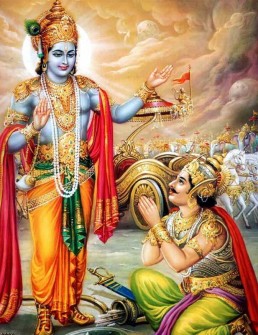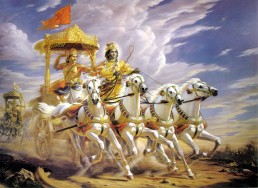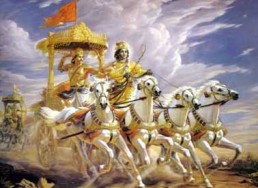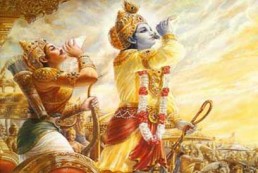Bhagavad Gita-Chapter 4 All Verses with Meaning and Audio
इमं विवस्वते योगं प्रोक्तवानहमव्ययम् ।
विवस्वान्मनवे प्राह मनुरिक्ष्वाकवेऽब्रवीत् ॥ ४-१॥
imaṃ vivasvate yogaṃ proktavānahamavyayam
vivasvānmanave prāha manurikṣvākave’bravīt 4-1
स कालेनेह महता योगो नष्टः परन्तप ॥ ४-२॥
sa kāleneha mahatā yogo naṣṭaḥ parantapa 4-2
भक्तोऽसि मे सखा चेति रहस्यं ह्येतदुत्तमम् ॥ ४-३॥
bhakto’si me sakhā ceti rahasyaṃ hyetaduttamam 4-3
अपरं भवतो जन्म परं जन्म विवस्वतः ।
कथमेतद्विजानीयां त्वमादौ प्रोक्तवानिति ॥ ४-४॥
aparaṃ bhavato janma paraṃ janma vivasvataḥ
kathametadvijānīyāṃ tvamādau proktavāniti 4-4
बहूनि मे व्यतीतानि जन्मानि तव चार्जुन ।
तान्यहं वेद सर्वाणि न त्वं वेत्थ परन्तप ॥ ४-५॥
bahūni me vyatītāni janmāni tava cārjuna
tānyahaṃ veda sarvāṇi na tvaṃ vettha parantapa 4-5
प्रकृतिं स्वामधिष्ठाय सम्भवाम्यात्ममायया ॥ ४-६॥
prakṛtiṃ svāmadhiṣṭhāya sambhavāmyātmamāyayā 4-6
अभ्युत्थानमधर्मस्य तदात्मानं सृजाम्यहम् ॥ ४-७॥
abhyutthānamadharmasya tadātmānaṃ sṛjāmyaham 4-7
धर्मसंस्थापनार्थाय सम्भवामि युगे युगे ॥ ४-८॥
dharmasaṃsthāpanārthāya sambhavāmi yuge yuge 4-8
त्यक्त्वा देहं पुनर्जन्म नैति मामेति सोऽर्जुन ॥ ४-९॥
tyaktvā dehaṃ punarjanma naiti māmeti so’rjuna 4-9
बहवो ज्ञानतपसा पूता मद्भावमागताः ॥ ४-१०॥
bahavo jñānatapasā pūtā madbhāvamāgatāḥ 4-10
मम वर्त्मानुवर्तन्ते मनुष्याः पार्थ सर्वशः ॥ ४-११॥
mama vartmānuvartante manuṣyāḥ pārtha sarvaśaḥ 4-11
क्षिप्रं हि मानुषे लोके सिद्धिर्भवति कर्मजा ॥ ४-१२॥
kṣipraṃ hi mānuṣe loke siddhirbhavati karmajā 4-12
तस्य कर्तारमपि मां विद्ध्यकर्तारमव्ययम् ॥ ४-१३॥
tasya kartāramapi māṃ viddhyakartāramavyayam 4-13
इति मां योऽभिजानाति कर्मभिर्न स बध्यते ॥ ४-१४॥
iti māṃ yo’bhijānāti karmabhirna sa badhyate 4-14
कुरु कर्मैव तस्मात्त्वं पूर्वैः पूर्वतरं कृतम् ॥ ४-१५॥
kuru karmaiva tasmāttvaṃ pūrvaiḥ pūrvataraṃ kṛtam 4-15
तत्ते कर्म प्रवक्ष्यामि यज्ज्ञात्वा मोक्ष्यसेऽशुभात् ॥ ४-१६॥
tatte karma pravakṣyāmi yajjñātvā mokṣyase’śubhāt 4-16
अकर्मणश्च बोद्धव्यं गहना कर्मणो गतिः ॥ ४-१७॥
akarmaṇaśca boddhavyaṃ gahanā karmaṇo gatiḥ 4-17
स बुद्धिमान्मनुष्येषु स युक्तः कृत्स्नकर्मकृत् ॥ ४-१८॥
sa buddhimānmanuṣyeṣu sa yuktaḥ kṛtsnakarmakṛt 4-18
ज्ञानाग्निदग्धकर्माणं तमाहुः पण्डितं बुधाः ॥ ४-१९॥
jñānāgnidagdhakarmāṇaṃ tamāhuḥ paṇḍitaṃ budhāḥ 4-19
कर्मण्यभिप्रवृत्तोऽपि नैव किञ्चित्करोति सः ॥ ४-२०॥
karmaṇyabhipravṛtto’pi naiva kiñcitkaroti saḥ 4-20
शारीरं केवलं कर्म कुर्वन्नाप्नोति किल्बिषम् ॥ ४-२१॥
śārīraṃ kevalaṃ karma kurvannāpnoti kilbiṣam 4-21
समः सिद्धावसिद्धौ च कृत्वापि न निबध्यते ॥ ४-२२॥
samaḥ siddhāvasiddhau ca kṛtvāpi na nibadhyate 4-22
यज्ञायाचरतः कर्म समग्रं प्रविलीयते ॥ ४-२३॥
yajñāyācarataḥ karma samagraṃ pravilīyate 4-23
ब्रह्मैव तेन गन्तव्यं ब्रह्मकर्मसमाधिना ॥ ४-२४॥
brahmaiva tena gantavyaṃ brahmakarmasamādhinā 4-24
ब्रह्माग्नावपरे यज्ञं यज्ञेनैवोपजुह्वति ॥ ४-२५॥
brahmāgnāvapare yajñaṃ yajñenaivopajuhvati 4-25
शब्दादीन्विषयानन्य इन्द्रियाग्निषु जुह्वति ॥ ४-२६॥
śabdādīnviṣayānanya indriyāgniṣu juhvati 4-26
आत्मसंयमयोगाग्नौ जुह्वति ज्ञानदीपिते ॥ ४-२७॥
ātmasaṃyamayogāgnau juhvati jñānadīpite 4-27
स्वाध्यायज्ञानयज्ञाश्च यतयः संशितव्रताः ॥ ४-२८॥
svādhyāyajñānayajñāśca yatayaḥ saṃśitavratāḥ 4-28
प्राणापानगती रुद्ध्वा प्राणायामपरायणाः ॥ ४-२९॥
prāṇāpānagatī ruddhvā prāṇāyāmaparāyaṇāḥ 4-29
सर्वेऽप्येते यज्ञविदो यज्ञक्षपितकल्मषाः ॥ ४-३०॥
sarve’pyete yajñavido yajñakṣapitakalmaṣāḥ 4-30
नायं लोकोऽस्त्ययज्ञस्य कुतोऽन्यः कुरुसत्तम ॥ ४-३१॥
nāyaṃ loko’styayajñasya kuto’nyaḥ kurusattama 4-31
कर्मजान्विद्धि तान्सर्वानेवं ज्ञात्वा विमोक्ष्यसे ॥ ४-३२॥
karmajānviddhi tānsarvānevaṃ jñātvā vimokṣyase 4-32
सर्वं कर्माखिलं पार्थ ज्ञाने परिसमाप्यते ॥ ४-३३॥
sarvaṃ karmākhilaṃ pārtha jñāne parisamāpyate 4-33
उपदेक्ष्यन्ति ते ज्ञानं ज्ञानिनस्तत्त्वदर्शिनः ॥ ४-३४॥
upadekṣyanti te jñānaṃ jñāninastattvadarśinaḥ 4-34
येन भूतान्यशेषेण द्रक्ष्यस्यात्मन्यथो मयि ॥ ४-३५॥ var अशेषाणि
yena bhūtānyaśeṣeṇa drakṣyasyātmanyatho mayi 4-35
सर्वं ज्ञानप्लवेनैव वृजिनं सन्तरिष्यसि ॥ ४-३६॥
sarvaṃ jñānaplavenaiva vṛjinaṃ santariṣyasi 4-36
ज्ञानाग्निः सर्वकर्माणि भस्मसात्कुरुते तथा ॥ ४-३७॥
jñānāgniḥ sarvakarmāṇi bhasmasātkurute tathā 4-37
तत्स्वयं योगसंसिद्धः कालेनात्मनि विन्दति ॥ ४-३८॥
tatsvayaṃ yogasaṃsiddhaḥ kālenātmani vindati 4-38
ज्ञानं लब्ध्वा परां शान्तिमचिरेणाधिगच्छति ॥ ४-३९॥
jñānaṃ labdhvā parāṃ śāntimacireṇādhigacchati 4-39
नायं लोकोऽस्ति न परो न सुखं संशयात्मनः ॥ ४-४०॥
nāyaṃ loko’sti na paro na sukhaṃ saṃśayātmanaḥ 4-40
आत्मवन्तं न कर्माणि निबध्नन्ति धनञ्जय ॥ ४-४१॥
ātmavantaṃ na karmāṇi nibadhnanti dhanañjaya 4-41
छित्त्वैनं संशयं योगमातिष्ठोत्तिष्ठ भारत ॥ ४-४२॥ॐ तत्सदिति श्रीमद्भगवद्गीतासूपनिषत्सु
ब्रह्मविद्यायां योगशास्त्रे श्रीकृष्णार्जुनसंवादे
ज्ञानकर्मसंन्यासयोगो नाम चतुर्थोऽध्यायः ॥ ४॥
chittvainaṃ saṃśayaṃ yogamātiṣṭhottiṣṭha bhārata 4-42oṃ tatsaditi śrīmadbhagavadgītāsūpaniṣatsu
brahmavidyāyāṃ yogaśāstre śrīkṛṣṇārjunasaṃvāde
jñānakarmasaṃnyāsayogo nāma caturtho’dhyāyaḥ 4

Description
Bhagavad Gita Chapter 4 Summary
Jñāna Karma Sanyāsa Yoga – Approaching the Ultimate Truth
Having emphasized the importance of action in the previous chapter, here the Lord begins a gradual transition to the superiority of pursuing knowledge. Virtues of the man of knowledge are pointed out and a variety of worldy sadhanas are described as being rooted in action. But the Lord ends the chapter by exhorting Arjuna to action since right actions, as described in this chapter, are essential for readying the mind for knowledge. Below are the main themes of Chapter 4:
Verses 1 – 8
Gītā-stuti and avatāra
Verses 9 – 15
Knowledge of avatāra and its result
Verses 16 – 24
The wisdom of seeing inaction in action and vice versa (The characteristics of the wise)
Verses 25 – 34
The glory and the means of knowledge
Verses 38 – 42
Benefit of knowledge 35 to 37
Verses 38 – 42
Qualifications and disqualifications
Gita Chapter 4 – Commentary by Swami Paramarthananda
Background
Lord Krishna dealt with karmayoga and sāṅkhyayoga in the third and second chapters respectively. These two yogas are not newly introduced by Krishna. It has been initiated by the Lord in the beginning of the creation itself through the karma-kāṇḍa and jñāna-kāṇḍa of the Vedas. Thus, this is an ancient wisdom which has stood the test of time.
Krishna begins the fourth chapter by referring to the above aspect so that Arjuna will have reverence for Gītā. The Lord points out that He initiated the lineage of Vivasvān (Lord Sun), Manu, Ikṣvāku, and others in the beginning of the creation (through the Vedas). It is the same ancient vedic wisdom which is being revived by Lord Krishna through Arjuna in the form of the Gītā because it had declined by that time (2, 3).
Now, Arjuna wonders how Krishna, who is his contemporary, can be the initiator of the ancient vedic wisdom (4). As an answer to this question, Krishna introduces the topic of avatāra (5 to 8). [We are born because of our own karma (vyaṣṭi-karma) as well as the total karma of the world (samaṣṭi-karma). In the case of the Lord, His own karma is not there. Thus the karma of the world becomes the cause for the birth of the Lord.] The evil actions of the wicked and the noble worship of the saints necessitates the manifestation (avatāra) of the Lord to punish the former and bless the latter. Thus the Lord establishes dharma in the universe (7, 8). But, since this birth is only through māyā, it is apparent. Hence it does not affect the true birthless nature of the Lord (6). Moreover, since māyā is under the control of the Lord, His omniscience, omnipotence, etc. are not veiled. He remembers all the past as well as His true nature. It is from this standpoint that Krishna says “I initiated the vedic tradition.”
From the 9th to the 15th verse, the Lord talks about His true nature and its knowledge. Though the Lord seems to be active, He is free from all activities and their results (13, 14). He is akartā and abhoktā. One who recognizes this nature of the Lord also becomes liberated i.e., becomes free from actions and their results (9). (This shows that the true nature of the Lord and jīva is one and the same.) But, being interested in the pursuit of various types of means and ends, one does not turn to this liberating knowledge (12). Still, some people manage to become one with the Lord by freeing the mind from attachment, hatred and fear, by surrendering to the Lord, and by finally gaining Self-knowledge (10). Lord gives whatever the devotee seeks (11).
From the 16th to the 25th verse, Krishna gives the knowledge of the nature of action and inaction and the characteristics of the person of such a knowledge. Having talked about the rareness of such a knowledge (16, 17), the Lord defines a wiseman as one who sees actionlessness (of the Self) amidst the activities (of the body) as well as (the potential) action in the seemingly inactive body (18).
(The idea is that the wise man accepts activities at the level of body because no one can expect relaxation at the body level. The very process of life is the continuous function of the body. One should only discover inner relaxation even amidst the activities by recognizing the true ‘I’ as the actionless Self. Therefore, true and complete renunciation is possible only through knowledge.)
In fact, the wise man never sees anything other than Brahman, that being the truth of all (25). Whether his body is active (20) or not (21), he is not affected. He is self-sufficient, contented, independent, equanimous, and free from fancies, desires, expectations, attachments, and jealousy. His actions are meant for the worship of the Lord which uplifts the humanity (22, 23).
From the 25th to the 34th verse, the Lord talks about the superiority of knowledge over all the other sādhanas and the way of getting that knowledge. Various sādhanas are compared to yajñas. They are: Brahmajñāna-yajña, deva-yajña, viṣayabhoga-yajña, dama-yajña, śama-yajña, prāṇāyāma-yajña and āhāraniyama-yajña. All sādhanas lead one to liberation by preparing the mind. But, being the direct means to liberation, Brahmajñāna-yajña is superior to all (33). To get this knowledge one should approach a guru who is established in the Truth (Tattva-darśi) and who has the necessary language to communicate it (jñānī). Such a teacher must be approached with humility, faith, and reverence and asked for this knowledge. Instructed by them through the scriptures, one gains knowledge; not otherwise (34).
From the 35th to the 37th verse, Krishna talks about the benefit of this knowledge. Gaining the knowledge, one will not get into delusion once again. For, he sees everything in the Lord as well as in him (i.e., he recognizes his identity with the Lord) (35). By this boat of knowledge one crosses over the ocean of sin however vast it may be (36). Like a blazing fire, this knowledge reduces to ashes (renders inoperative) all the karmas (37). Hence, knowledge is the greatest purifier. (All other sādhanas can produce puṇya which itself is a bondage. Moreover, no other sādhana can destroy ignorance which is the root cause of all sins.) That seeker who has purified the mind will soon attain knowledge by the teaching of a guru (38).
In the concluding verses (38 to 42), Bhagavān talks about the qualifications and disqualifications with regard to Self-knowledge. One who has faith in the guru and the śāstra, sense-control, and a sincere desire for knowledge will gain the knowledge (39). On the other hand, one who is ignorant, faithless, and doubting is doomed. He cannot enjoy anything in the here or in the hereafter (40). Therefore, “Arjuna! Eliminate all doubts regarding the validity of these spiritual pursuits, and resort to karmayoga”, advises Lord Krishna (42).
Karmas do not bind one who is ultimately established in the doubtless knowledge of the Self (41). This is freedom through knowledge in spite of action — jñānakarmasannyāsa.
Gita 4th Chapter – Main Points
1. Gītā-stuti and avatāra: 1 to 8
2. Knowledge of avatāra and its result: 9 to 15
3. The wisdom of seeing inaction in action and vice versa (The characteristics of the wise): 16 to 24
4. The glory and the means of knowledge: 25 to 34
5. Benefit of knowledge: 35 to 37
6. Qualifications and disqualifications: 38 to 42
Since the renunciation of all activities through the knowledge of the actionless ‘I’ amidst the activities of the body is the main topic here, this chapter is called Jñānakarmasannyāsa-yoga.
Other Bhagavad Gita Shlokams
Bhagavad Gita
The Bhagavad Gita, or the Song of the Lord, is a dialogue between Krishna, an incarnation of Vishnu, and his friend and disciple, Arjuna. Composed of 701 Shlokas arranged in 18 chapters, the Gita is one of the best-known philosophical texts of…
Bhagavad Gita-Chapter 01 All Verses with Meaning and Audio
Bhagavad Gita Chapter 1 All Verses for easy chanting along with Audio and Meaning. Lyrics In English, Sanskrit, Hindi, Telugu, Tamil, Gujarati, Bengali and many more languages.
Bhagavad Gita-Chapter 02 All Verses with Meaning and Audio
Bhagavad Gita Chapter 2 All Verses for easy chanting along with Audio and Meaning. Lyrics In English, Sanskrit, Hindi, Telugu, Tamil, Gujarati, Bengali and many more languages.
Bhagavad Gita-Chapter 03 All Verses with Meaning and Audio
Bhagavad Gita Chapter 3 All Verses for easy chanting along with Audio and Meaning. Lyrics In English, Sanskrit, Hindi, Telugu, Tamil, Gujarati, Bengali and many more languages.
Bhagavad Gita-Chapter 05 All Verses with Meaning and Audio
Bhagavad Gita Chapter 5 All Verses for easy chanting along with Audio and Meaning. Lyrics In English, Sanskrit, Hindi, Telugu, Tamil, Gujarati, Bengali and many more languages.
Bhagavad Gita-Chapter 06 All Verses with Meaning and Audio
Bhagavad Gita Chapter 6 All Verses for easy chanting along with Audio and Meaning. Lyrics In English, Sanskrit, Hindi, Telugu, Tamil, Gujarati, Bengali and many more languages.
Bhagavad Gita-Chapter 07 All Verses with Meaning and Audio
Bhagavad Gita Chapter 7 All Verses for easy chanting along with Audio and Meaning. Lyrics In English, Sanskrit, Hindi, Telugu, Tamil, Gujarati, Bengali and many more languages.
Bhagavad Gita-Chapter 08 All Verses with Meaning and Audio
Bhagavad Gita Chapter 8 All Verses for easy chanting along with Audio and Meaning. Lyrics In English, Sanskrit, Hindi, Telugu, Tamil, Gujarati, Bengali and many more languages.
Bhagavad Gita-Chapter 09 All Verses with Meaning and Audio
Bhagavad Gita Chapter 9 All Verses for easy chanting along with Audio and Meaning. Lyrics In English, Sanskrit, Hindi, Telugu, Tamil, Gujarati, Bengali and many more languages.
Bhagavad Gita-Chapter 10 All Verses with Meaning and Audio
Bhagavad Gita Chapter 10 All Verses for easy chanting along with Audio and Meaning. Lyrics In English, Sanskrit, Hindi, Telugu, Tamil, Gujarati, Bengali and many more languages.
Bhagavad Gita-Chapter 11 All Verses with Meaning and Audio
Bhagavad Gita Chapter 11 All Verses for easy chanting along with Audio and Meaning. Lyrics In English, Sanskrit, Hindi, Telugu, Tamil, Gujarati, Bengali and many more languages.
Bhagavad Gita-Chapter 12 All Verses with Meaning and Audio
Bhagavad Gita Chapter 12 All Verses for easy chanting along with Audio and Meaning. Lyrics In English, Sanskrit, Hindi, Telugu, Tamil, Gujarati, Bengali and many more languages.
Bhagavad Gita-Chapter 13 All Verses with Meaning and Audio
Bhagavad Gita Chapter 13 All Verses for easy chanting along with Audio and Meaning. Lyrics In English, Sanskrit, Hindi, Telugu, Tamil, Gujarati, Bengali and many more languages.
Bhagavad Gita-Chapter 14 All Verses with Meaning and Audio
Bhagavad Gita Chapter 14 All Verses for easy chanting along with Audio and Meaning. Lyrics In English, Sanskrit, Hindi, Telugu, Tamil, Gujarati, Bengali and many more languages.
Bhagavad Gita-Chapter 15 All Verses with Meaning and Audio
Bhagavad Gita Chapter 15 All Verses for easy chanting along with Audio and Meaning. Lyrics In English, Sanskrit, Hindi, Telugu, Tamil, Gujarati, Bengali and many more languages.
Bhagavad Gita-Chapter 16 All Verses with Meaning and Audio
Bhagavad Gita Chapter 16 All Verses for easy chanting along with Audio and Meaning. Lyrics In English, Sanskrit, Hindi, Telugu, Tamil, Gujarati, Bengali and many more languages.
Bhagavad Gita-Chapter 17 All Verses with Meaning and Audio
Bhagavad Gita Chapter 17 All Verses for easy chanting along with Audio and Meaning. Lyrics In English, Sanskrit, Hindi, Telugu, Tamil, Gujarati, Bengali and many more languages.
Bhagavad Gita-Chapter 18 All Verses with Meaning and Audio
Bhagavad Gita Chapter 18 All Verses for easy chanting along with Audio and Meaning. Lyrics In English, Sanskrit, Hindi, Telugu, Tamil, Gujarati, Bengali and many more languages.
Gita Dhyanam
The Gītā Dhyānam, also called the Gītā Dhyāna or the Dhyāna Ślokas associated with the Gītā, is a 9-verse Sanskrit poem that has often been attached to the Bhagavad Gita, one of the most important scr
Bhagavad Gita-Chapter 4 All Verses with Meaning and Audio – Bhagavad Gita – Bhagavad Gita Chapter 4 All Verses Easy Chanting with Audio and Meaning, Lyrics




